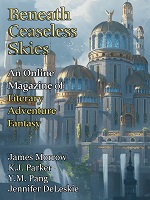 Beneath Ceaseless Skies #366, October 6, 2022
Beneath Ceaseless Skies #366, October 6, 2022
“Fire and Brimstone in the Twin Cities” by James Morrow
“Playing God” by K.J. Parker
“The Mountains My Bones, the Rivers My Blood” by Y.M. Pang
“But Mayflies on the Water, Gazing at the Sun” by Jennifer DeLeskie
Reviewed by Victoria Silverwolf
In celebration of its fourteenth anniversary, the magazine offers a special double-sized issue, with four stories rather than the usual two. Whether by design or accident, all of these new works deal with relationships between human beings and deities.
In “Fire and Brimstone in the Twin Cities” by James Morrow, an angel transports Martin Luther back in time to Sodom and Gomorrah before their destruction. The cities are populated by prosperous, virtuous people. It is only after Luther preaches to the inhabitants about original sin that they become wicked.
There is much more to this story than the basic plot indicated above, but an attack on the doctrine of inherent human sinfulness seems to be its main point. The author is famous for many satiric tales on religious themes, and this sardonic version of a famous incident in the Bible is no exception.
Obviously, one’s opinion on matters of faith will have a strong effect on one’s reaction to this work. In particular, those who see Martin Luther as a hero of the Reformation are likely to be disturbed by the way he is shown to be a foolish fanatic who brings destruction to good people.
Even for a satiric tale, there are aspects of the plot that are too modern for one to suspend one’s belief. A variation of the well-known Prisoner’s Dilemma from game theory begins the story. The author also offers ten new commandments reflecting liberal opinions, some of which would have been virtually unknown just a few decades ago.
“Playing God” by K.J. Parker takes place in a mythological version of the ancient world. (Although the deities in the story are not given their familiar names, they seem to be those from the Greek pantheon.) A goddess sends the narrator on a mission to kill all the men and enslave all the women and children of a city that has offended her. Loathe to perform such a heinous act but unable to resist the all-powerful deity, he attempts to obtain help from other gods.
The author depicts the goddess as a vain, cruel, selfish being, almost like a spoiled child. The other gods are equally flawed, even when they attempt to aid the narrator. There is much philosophical discussion of freedom, some of it seemingly contradictory. Both the sea and death are said to be the only true sources of freedom. Some readers may find the plot’s fatalism, with the narrator subject to the whims of the gods, depressing.
In “The Mountains My Bones, the Rivers My Blood” by Y.M. Pang, a goddess in one world sends a human warrior, granted great power, to other worlds in order to kill their gods and thus win their territory for his patroness. He reaches a world where a god has already killed all the other deities on the planet. After a battle in which the god defeats the man, but does not kill him, the pair go on to become lovers. That is hardly the end of their struggles, however.
This is a lengthy and complex work with a unique and highly original background, full of imaginative details. The author creates an entirely new mythos of gods and worlds in a convincing manner. I wish I could say that the characters were as convincing as the setting, but their behavior seems inconsistent. It may be that I simply find it hard to believe in the god and the man falling in love after engaging in a violent struggle.
We turn to ancient Mesopotamia in “But Mayflies on the Water, Gazing at the Sun” by Jennifer DeLeskie. The narrator is a humble fellow who winds up removing lice from the body of a god in the form of an enormous sturgeon. This difficult and unpleasant task becomes the least of his worries when the fishy deity announces that it is going to wipe out the city with a deluge. The hapless narrator uses trickery in an attempt to survive the disaster.
The story has the mood of very dark comedy, with violent death presented as if it were slapstick. The narrator repeats several phrases multiple times throughout the work. This lends the text a sense of being authentic ancient writing, but readers may grow tired of the technique.
Victoria Silverwolf has been doing a lot of photocopying lately.